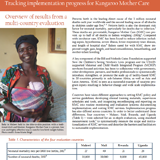
Overview of results from a multi-country evaluation
Preterm birth is the leading direct cause of the 3 million neonatal deaths each year worldwide and the second leading cause of all deaths in children under age five.1, 2 Preterm birth is also the dominant risk factor for neonatal mortality, particularly for deaths due to infection.3 These deaths are preventable; Kangaroo Mother Care (KMC) can prevent up to half of all deaths in babies weighing <2000g4. Compared with incubator care, KMC has been found to reduce infection including sepsis, hypothermia, severe illness, lower respiratory tract disease, and length of hospital stay.5 Babies cared for with KMC show improved weight gain, length, and head circumference, breastfeeding, and mother-infant bonding.5
A key component of the Bill and Melinda Gates Foundation-supported Save the Children’s Saving Newborn Lives program and the USAIDsupported Maternal and Child Health Integrated Program (MCHIP) newborn-focused activities has been to collaborate with governments, other development partners, and health professionals to systematically introduce, strengthen, or promote the scale up of facility-based KMC in 20 countries primarily in sub-Saharan Africa, as well as Asia and Latin America. KMC is seen as a successful example of catalytic program inputs resulting in behavior change and wide scale implementation.
Countries have taken different approaches to setting KMC policy and service guidelines; developing clinical training materials, supervision schedules and tools, and integrating recordkeeping and reporting on KMC into routine monitoring and evaluation systems; documenting implementation; and costing KMC services. Implementation progress has also differed across countries. In order to better understand these differences, four countries – Malawi, Mali, Rwanda, and Uganda (Table 1) – were selected for an in-depth evaluation, using standard measurement tools,6 to systematically measure the scope and institutionalization of KMC services and describe the barriers and facilitators to sustainable implementation.